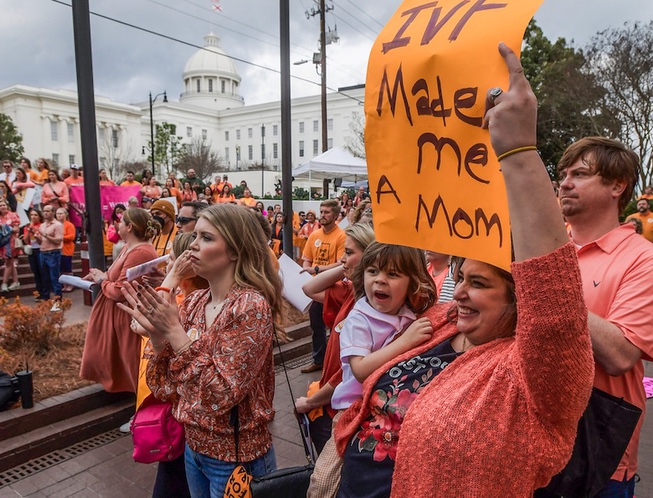
Mickey Welsh/The Montgomery Advertiser via AP
Veronica Wehby-Upchurch holds a sign and son Ladner Upchurch as hundreds gather for a rally for in vitro fertilization legislation Wednesday, Feb. 28, 2024, in Montgomery, Ala.
Sunday, March 3, 2024 | 2 a.m.
Cyndy Flores was sitting in a Las Vegas fertility clinic for an ultrasound late last month when her phone buzzed and a sense of sudden shock came over her.
It was a news alert about a decision from the Alabama Supreme Court, which ruled Feb. 20 that frozen embryos in test tubes should be treated the same as a child or gestating fetus under the state’s wrongful death statute — a move that has since led at least three Alabama fertility clinics to pause services related to in vitro fertilization, or IVF, while the ramifications of the ruling are sorted.
Flores, 36, who began IVF at the beginning of February and is still undergoing treatment, couldn’t help but feel angry for the Alabamians who have been at least temporarily stripped of the prospects of parenthood.
“It’s a hard process, and I never thought it would be our process,” Flores said. “It’s such a personal experience and it’s such a hard thing emotionally, physically and financially to go through.”
The Alabama ruling, Flores contended, is a direct consequence of the U.S. Supreme Court’s 2022 decision to overturn Roe v. Wade, which for nearly 50 years had presumed the constitutional right to access abortion and other reproductive care. And while it appears IVF will remain readily accessible here in Nevada, the Alabama ruling has sparked a political frenzy in a presidential election year. A movement in the Alabama Legislature to shield fertility clinics from prosecution and civil lawsuits is being fast-tracked to become law.
“The ruling in Alabama didn’t happen out of nowhere,” Flores said. “It is a direct result from (former President) Donald Trump and him appointing three Supreme Court Justices who overturned Roe v. Wade.”
Flores continued: “Whatever the outcome is in November, that is going to set the tone and the outcome of procedures like IVF and our ability to choose to start our families.”
IVF involves retrieval of eggs from a woman and sperm from a man to be combined in a laboratory dish in hopes of creating an embryo and remains one of the most successful treatments for managing infertility, according to Yale Medicine. That process sometimes creates multiple embryos, which are then stored at subzero temperatures until embryos are ultimately transferred to a woman’s uterus.
A 2022 journal published in the National Library of Medicine estimates 10 million children globally have been born as a result of IVF and other fertility treatments since 1978, resulting in about 500,000 births annually. Fertility treatments account for roughly 2% of all births in the U.S. today.
Congressional Democrats last week renewed a legislative push to pass the Access to Family Building Act, which would codify protections for so-called assisted reproductive technologies — a legal term that describes IVF and other fertility treatments. Introduced in both chambers in January, lawmakers in the Senate used a maneuver to bring the bill to a direct vote, though it was blocked Wednesday by Sen. Cindy Hyde-Smith, R-Miss., who accused the legislation of “vast overreach.”
That has led Democrats eager to tie former President Donald Trump and congressional Republicans to the Alabama court ruling as a consequence of overturning Roe. In the months following the Supreme Court’s ruling overturning Roe, Democrats successfully fended off losses during the 2022 midterms using the issue of abortion access to retain control of the Senate and retain a narrow minority in the House.
Nevada U.S. Sen. Catherine Cortez Masto, during a floor speech after Wednesday’s vote, called Hyde-Smith’s manuever an example of the GOP’s “hypocrisy … on full display,” while Nevada U.S. Rep. Susie Lee told the Sun congressional Republicans are on a “march to controlling women’s choices.”
Cortez Masto and Lee are among the five Democrats in Nevada’s federal delegation who have co-sponsored the bill in their respective chambers. No Republicans have signed onto the bill.
“They will find any excuse they can to not support giving women, couples, many people who are struggling with fertility, having access to what I believe is important treatment,” said Lee, who added her two children were conceived through IVF.
Even as Democrats attempt to tie the GOP to restrictions on IVF, Trump and many other Republicans have said they supportws access to the treatment and have no desire to restrict its access. A Feb. 23 memo from the National Republican Senatorial Committee, the official fundraising arm of the Senate GOP conference, is urging candidates “clearly and concisely reject efforts by the government to restrict IVF.”
That same memo referenced polling that stated 85% of respondents supported increasing access to fertility-related services.
“A recent ruling by the Alabama Supreme Court is fodder for Democrats hoping to manipulate the abortion issue for electoral gain,” the memo starts. “There are zero Republican Senate candidates who support efforts to restrict access to fertility treatments.”
In a social media post the same day the National Republican Senatorial Committee memo was dated, Sam Brown, who is running in the Republican primary to challenge Sen. Jacky Rosen, D-Nev., in November, expressed that he and his wife supported IVF.
“Amy and I believe we should do more to promote loving families and help people experience the joys of parenthood,” Brown wrote. “IVF and other similar fertility treatments are a blessing for so many families seeking that joy and we should ensure they remain accessible for them.”
Brown’s campaign did not respond to a request for comment to elaborate further his support for IVF or questions about how he would vote on the legislation. And though he’s voiced support over IVF treatment, Democratic strategists and pro-choice groups have tried to frame GOP inaction on the IVF issue with reports Trump would seek a ban on abortions past 16 weeks, with exceptions for rape, incest or the health of the mother.
Brown in an interview with NBC News last month said he had “closed the door” on support for a federal abortion ban and said he respected Nevada’s existing law protecting abortion access through the first 24 weeks of a pregnancy.
Brown’s break with the party comes as some Republicans say the overturning of Roe left abortion as an issue to be dealt with state-by-state. Democrats, meanwhile, say they are challenging their colleagues to create uniform access to reproductive care nationwide.
“I don’t think there’s anything more pro-life than in vitro fertilization,” Lee said.





